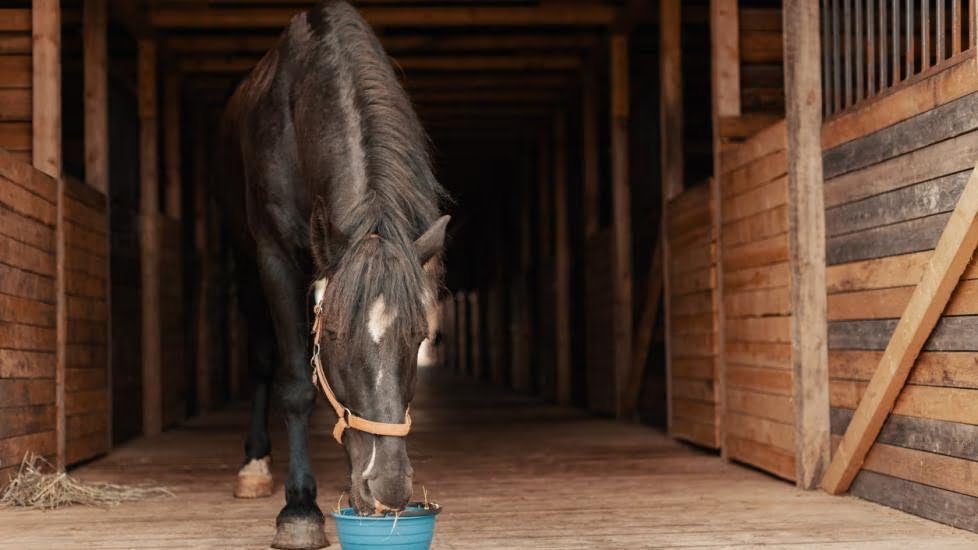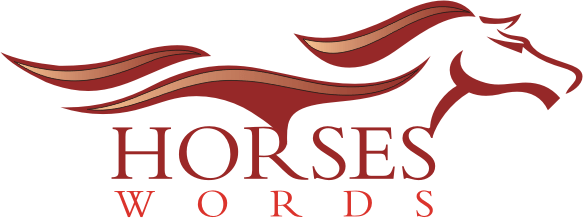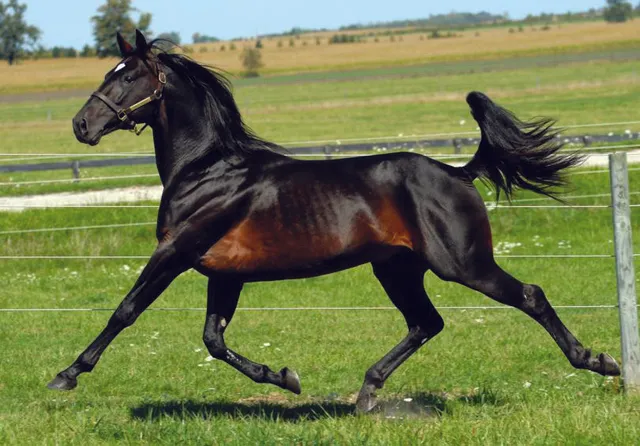Horse Feeding: Everything You Need to Know for Optimal Nutrition
Good nutrition is vital to the overall health and well-being of horses. First of all, there is no generic ideal diet for a horse; every individual will have specific dietary needs that are determined by its lifestyle.
All horses must be on forage; its the foundation of a great diet.In certain cases, horses may need extra grain or supplements to meet their own unique dietary requirements.
Anyone interested in helping a horse live to its full potential should not avoid learning about them.
Key Takeaways
- The first is equine nutrition which will enhance the health of your horse.
- Grass and forage are the main part of a horse’s diet by far.
- Most horses will need supplemental feed or an alternative diet.
The Horse’s Digestive System
It takes food between 45 and 72 hours to pass through the digestive system of a horse. The system is broadly divided into the fore gut and hind gut.
Foregut: Stomach small intestine. Its main function is to digest food and absorb nutrients such as carbohydrates, proteins, fats, vitamins and minerals. On the other hand, the hindgut consists of the cecum, large colon, small colon and then rectum.
There are millions of microbes, bacteria and protozoa in this area. These organisms aid in the digestion of cellulose contained within roughage, an important component to a horses diet.
A horses stomach is not that big next to its body size. Their limitation in the amount of food they can hold at one time.
The stomach cavity is divided into two regions; the glandular and non-glandular. Gridy Horses also produce gastric acid throughout the day whereas humans only release it during eating. That is because they are programmed to eat little and often.
I have to feed my horse at least two meals a day for their digestive system to remain in good shape and give it the best opportunity. More frequent feeding: Many horses do better eating three or more meals per day.
This pattern of feeding helps to avoid problems such as gastric ulcers.
Horses generally should be fed 1-2% of their body weight per day in forage. A 1000 lb horse, for example should be eating between 10-20 pounds of FORAGE every day.
I introduce new foods by slowly incorporating over the course of 5-7 days. This helps to prevent digestive disorders such as diarrhea, colic or laminitis.

Nutrient Requirements of Horses
Healthy horses need six core nutrients and sound nutritional support to thrive on the track.
Carbohydrates
Carbohydrates are an important energy source in the diet of horses. Those 2 Types of Carbohydrates (Structural and Non-structural carbohydrates -NSC) In the hay and grass, structural carbohydrates (cellulose) are present. In certain horses, controlling NSCs in starch and sugar they consume with issues such as Polysaccharide Storage Myopathy (PSSM) or Cushing’s disease.
Fats
The fats and oils, however also function as an energy source but are more calorie-packed than carbohydrates. Fats pack 2.25 times more energy per gram than carbs do. For horses that do not manage NSCs effectively, be wary of going over 10% fats or oils in a horse’s diet.
Proteins
Yes, many feeds display the protein content but what we actually need is amino acids. Proteins are metabolised during digestion into amino acids.
These amino acids are absorbed into the blood stream and carried throughout the body in order to build muscles, organs, bones; make up blood cells which carry oxygen to all parts of your horses body.
Amino acids that are not used to repair the body or to grow can be turned into energy, excreted from the body.
Minerals
Minerals are therefore inorganic nutrients that the body needs only small amounts of. The key mineralities are iron, phosphorus copper along with the calcium as well as magnesium.
The blood cannot carry oxygen without iron and bones/teeth must be strong in order to walk at 5 years of age thus calcium/phosphorus are mission critical.
Vitamins
The next vital nutrients are the vitamins, which we need very small quantities of these to survive. Vitamins – Most vitamins are provided by grasses from grazing alone. Horses that do not graze frequently might need vitamins for their overall health.
Water
The most important nutrient is water, comprising 70-75% of a horse’s body. It regulates body temperature and its metabolic effects. An average horse consumes roughly from 10-15 gallons of water a day based on its size, work level and environment.
This knowledge will enable me to better take care of my horse so they can remain healthy and full of vigor.
Horse Feed Options
For all the calories they burn running away from Hwy 35, Horses need a balanced diet. Many times I give them a variety of feeds to help get what they need.
Hay
Hay the majority of a horse’s diet Most often found in grass or legumes. Match Grass hay (like Orchard) with Easy Keepers or Light Work Rails.
The same people who are treating their horses as pets, often use a very high quality of alfalfa hay which is great in calorie and energy content for working horses or lactating mares. The leaves in the hay are very nutrient rich, and hence is nutritious.
Pasture
There are many advantages to having access to pasture. Healthy Pastures reduce feed costs and provide essential nutrients as quality forage, i.e.,protein, vitamins,and minerals.
Grass has to be cut so this does´t get too long and the animals can feed on it. In addition to feeding horses, grazing allows them exercise as well.
Concentrates
Skinners do offer a nice range of dry and wet, but the Topspec concentrates incorporate small grains such as corn, oats & barley. They are higher in energy and lower in fiber than grass hays or pasture.
Choosing grains of a certain quality is vital for the well-being and health of my horse. The safest and best choice for starch is often oats, with higher fibre (extra slow release) but also more protein than say corn.
If you overfeed concentrates, this can upset your horse’s gut function as well and cause problems like colic or inflammation.
Supplements
Diet could also have a role in the will of pills, but only if they are needed by the horse. In addition to forage the guys can get a boost from grains. I never recommend any new supplements without first talking to my vet, because every dog is different.
Commercial Grain/Whole Feed
Commercial grains, on the other hand, are a mix of several types of cereal and additives to improve nutrition. HIGH IN FIBER COMPLETE FEEDS, which are custom designed to suit a horse’s age or lifestyle. Convenience to give your horse a balanced diet without much fuss.
In conclusion, my horse will need to have access to hay and or pasture in addition potentially concentrates (sometimes called grain), supplements if needed as well commercial feeds. Using the right blend is how I can successfully support my horse’s health and well being.
Feeding Routines for Horses
That is a system of feeding your horse that should occur every day, whether the have just come in from show jumping at age 5 or they are mud people out there.
I would mostly rather feed very small amounts of grain at a time or break meals up into multiple times throughout the day, versus feeding one big meal.
My horse needs to have hay forage all day long or be able to graze on pasture. For those following a program I change things in over 5–7 days slowly.
This will help to avoid diseases such as colic or diarrhoea. For nutritional questions regarding my horse’s diet or any individual needs that he may have, I turn to my equine nutritionist of course with the assistance and approval of my vet.
Horse Feeding Tips
Evaluating Nutritional Needs
First off, I evaluate my horses body condition. This is how I get a good idea of which nutrients are needed. Horse Diet: #1– Forage (e.g. hay or pasture) should be the mainstay of my horse’s diet.
The vast majority of horses require no grain or supplements, which is all I personally give (besides dictate what types and amounts depending on horse age/lifestyle as per a vet)
Feeding Observations
Horses in general are not very picky when it comes to food. If I see my horse not eating well at all or acting even remotely off about food, the vet gets called. I would want to investigate any issues in my horses mouth or even the digestive system.
Safe Feeding Practices
I am careful in food preparation for my horse. I smell hay and grain for mold, dead animals or bad smells. Whenever I see any of these problems, the food does not get into my horse Poor quality feed can make a horse sick just as it affects people and is likely deadly.
References
AAEP. Healthy paints from the nutrition( AAEP) 2016.
Penn State Extension. Feeding Horses. 2015.




